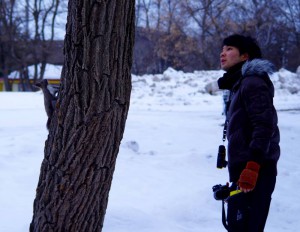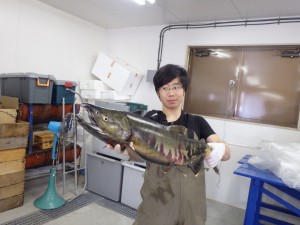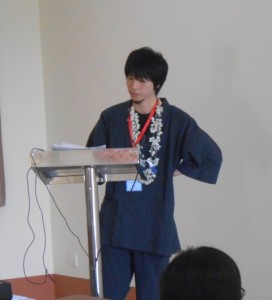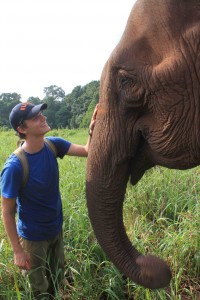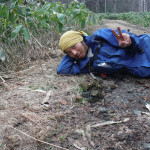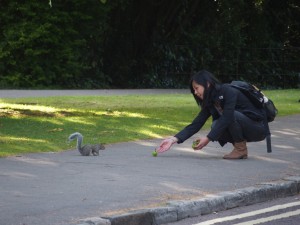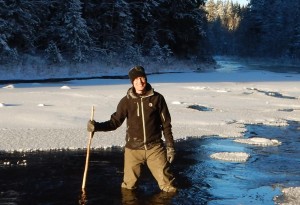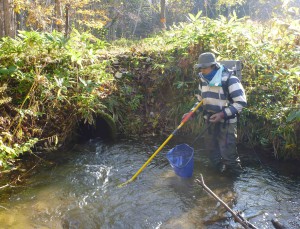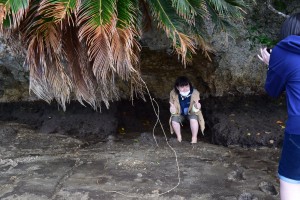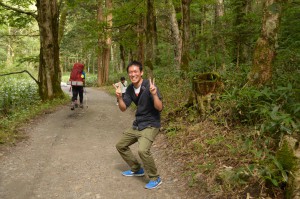Pos doc fellow
Kenta UCHIDA
PhD student (3+ year)
k.uchida(at)ees.hokudai.ac.jp
Personality of red squirrels and adaptation to urbanization
Many wild animals have invaded and adapted to urban areas with the increase in urbanization. Recently it has been understood that such animals have specific behaviors or life histories. I will try to determine why such animals can adapt and how they cope with man-made environments, focusing on the behavior and personality of Eurasian red squirrels. “Be excited with the wonder of animals!!”
Doctor course
Shingo NAKAMURA
PhD student (3+ year)
shingo.masu(at)fsc.hokudai.ac.jp
Population structure of masu salmon in urban cities
Keisuke ATSUMI (CV)
PhD student (3+ year)
k.atsumi115(at)gmail.com
Behavioral mechanisms of inter-specific mating
I joined here since 2016 as a PhD course student. My research interests are: (1) function of mutual ornament in Far Eastern daces (genus Tribolodon) and (2) how individual characteristics & conditions affect their propensity for hybridization. I’ve worked on anatomy & conservation genetics on several fishes during BS & MS courses, but I’m broadly interested in ecology & evolution. Experiments are mostly conducted on Far Eastern daces but I’m planning to do experiments also in nine-spine sticklebacks.
Yusaku Ohkubo
PhD student (3+ year)
ohkubo_yusaku(at)eis.hokudai.ac.jp
Statistical modeling in ecology and evolution
Ecologists and evolutionary biologists should not be satisfied only with fieldwork; it’s just a data collection, we need inferences.
However, picking up useful information from noisy and confounding data like we meet is one of the most challenging tasks in statistics. I’m developing methodologies for more credible and accurate inferences in these entangling situations and applying them to real ecological data.
Chris Ayer
PhD student (3rd year)
ayermcg (at) hotmail.com
Effects of ectoparasites on migration behaviour in salmonids
My name is Christopher Ayer, I am a Canadian grad student interested in freshwater parasites and their ecology. This is my first time researching fish and aquatic ecosystems and I’ve learned much in just the few months since my arrival. While this isn’t my first time to Japan, I am thankful for the welcoming attitude of my lab-mates and all the guidance I have received studying here.
Jason Anders
PhD student (2nd year)
janderslee(at)ees.hokudai.ac.jp
Urban parasitology in small mammals
I have a deep and passionate love for animals and nature, and want to help protect every bit of it I can before we destroy what little we have left. My current research falls into the realm of Urban Parasitology, an emerging field of study. I’m now investigating how the urban environment affects parasite community and prevalence within wildlife populations. I’m interested in how these changes potentially impact conservation efforts of endangered species as well as human health.
Nature is unimaginably complex, and we as humans tend to forget that we are part of it, that we are another member in the community of organisms. Every time we change or destroy part of it, it affects us, even if we don’t realize it. Therefore, conservation is about far more than just protecting nature simply for its beauty. I can only hope that my research helps to spark a paradigm shift in the way the public views conservation, as well as public policy and urban development so that we can create a more sustainable society that is friendlier to nature.
Kanji Tomita (Personal Page)
PhD student (1st year)
ktomita38[at]gmail.com
Brown bear digging for cicada nymphs
I’ve been interested in the ecological roles (e.g. ecosystem engineer) of terrestrial animals, especially, the brown bear. In undergrad, I studied on brown bear population trends in northern part of Hokkaido, Japan (as a cooperative research). Since postgraduate course, I’ve studied brown bear digging for cicada nymphs. In the Shiretoko Natural Heritage, eastern part of Hokkaido, brown bears have started digging for cicada nymphs since 2000. I’m investigating the reason why bears start digging for cicada nymphs and their ecological function of soil disturbance. (More details are shown in my personal page.)
Since 2020, I start another project on belowground species interaction between plant roots and root feeders (e.g. cicada & grub, nematode).
“terra incognita” !! (a motto of my former superviser)
Kenta Nagatsuka
Master student (2nd year)
KentaNagatsuka(at)ees.hokudai.ac.jp
Theme under construction
My undergraduate major was engineering, but the lectures in ecology I took during my exchange program to Canada fascinated me and led me here Hokkaido. I haven’t decided my thesis yet, but I’m currently interested in social learning and its mechanism in animals. I hope my study here leads to a good and interesting research.
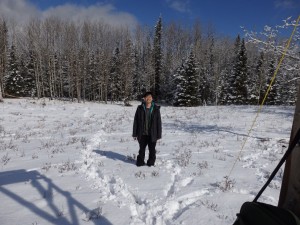
Ayaka Sawada
Master student (2nd year)
a.sawada(at)ees.hokudai.ac.jp
Hybridization between native chipmunk and pet-released alien chipmunk

李 瀟園 /Li Xiao yuan (Lily)
Master student (1st year)
as314719418(at)eis.hokudai.ac.jp
Why long-clawed shrew (Sorex unguiculatus) has giant penis?

Teppei Kimura (Ohdachi lab)
Master student (1st year)
kimutetu0812(at)eis.hokudai.ac.jp
Phytogeography of crayfish worms
I’m interested in the phylogeography, because this analysis shows us the specie’s historical processes. So, I came to Hokudai to study the phylogeographyof crayfish worms that live on the body of endangered Japanese crayfish. I’m excited to conduct field and lab works in the great nature of Hokkaido.
I’ll do my best!!
JSPS pos doc fellow
Pizza Ka Yee Chow (Personal website)
kyc202(at)exeter.ac.uk
Squirrel’s cognition
My research interest broadly lies in the evolution of cognition, with a more specific focus on animal learning, behaviour and cognition. I understand how do different factors (e.g. urbanization) may shape different cognitive performance, using squirrels as my primary study model. To understand animals’ mind and behaviours, I conduct both laboratory and field studies. See my webpage for more details here (PKAC personal website).
JSPS pos doc fellow
Johan Watz (Google Scholar page)
johan.watz (at) gmail.com
Habitat segregation in stream salmonids: thermal effects on intra- and interspecific competition
My research area is behavioral ecology, and I focus on studying mechanisms that cause variation in behavior, growth, stress responses and survival of stream salmonids. I am currently studying how factors of the physical and social environment affect the competitive abilities of Dolly Varden and white-spotted charr. Previously, I have worked with both basic and applied aspects of stream winter ecology, using brown trout as test species. I am also interested in stream habitat restoration and eel conservation.
Sho FUKUI
PhD student (3+ year)
s-fukui(at)ees.hokudai.ac.jp
Hybridization between introduced trout and native charr
Brook trout, an invasive species, is frequently interbreeding with native white-spotted charr in Furano, Hokkaido. This hybridization may have negative impacts for native charr. I am especially interested in how the traits of individuals contribute to interbreeding and population persistence. Thus, I am studying the changes in distribution of brook trout, white-spotted charr, and their hybrids. My field work also includes individual-based traits and hybridization effects on their fitness using molecular analysis.
Honami Maita
Master student (2nd year)
hmaita(at)eis.hokudai.ac.jp
Mechanisms for the divergence of life history dimorphism in male masu salmon
Mitsuru Watanabe
Master student (2nd year)
watanabe.m(at)ees.hokudai.ac.jp
Population genetic structure of urban squirrels
“I like nature!” “I want to do fieldwork!” and “I want to study ecology!” – these are the reasons that I quit my job and came to this lab. Although I have not decided my study theme yet, I’d like to study conservation ecology and behavioral ecology of wild animals in Hokkaido.

